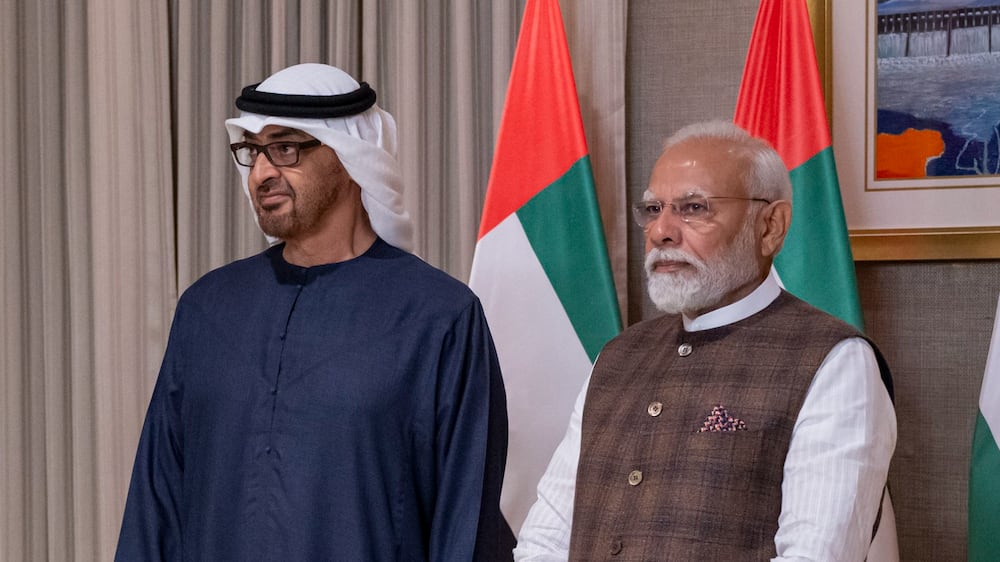India's trade with the UAE has expanded despite a slowdown in global trade, with experts anticipating further growth in volumes between the two countries.
Non-oil trade between the Emirates and India grew by 3.9 per cent in 2023, accounting for more than 7.6 per cent of the UAE’s total trade, official data shows.
By contrast, the UN trade organisation Unctad in December estimated that global trade was set to contract by 5 per cent in 2023, while warning of a “still uncertain but overall pessimistic” outlook for 2024.
It said that the decline was due to “diminished demand in developed nations and] underperformance in East Asia economies”.
While analysts are upbeat on the outlook for UAE-India trade, as the two countries continue to boost ties and as India is expected to be the world’s fastest growing major economy this year, they warn that any escalation in conflicts in Gaza and Ukraine and attacks on ships in the Red Sea by Houthi fighters remain risk factors.
“The outlook for UAE-India trade is highly favourable, with multiple factors poised to drive continued expansion in the coming years”, says Monica Sood, chairwoman of India's National Unity and Security Council.
President Sheikh Mohamed signs deals with India's Modi

Behind last year’s growth in non-oil trade and the potential for further expansion in UAE-India trade is a burgeoning partnership over the years, including the recent Comprehensive Economic Partnership Agreement (Cepa) and the launch of a mechanism to settle trade in local currencies, Ms Sood told The National.
“Ongoing discussions between the UAE and India aimed at enhancing non-oil commerce, particularly in rupees, indicate a mutual commitment to deepening trade ties,” she added.
This comes as the UAE is striving to diversify its economy and has been sharply focusing on boosting its trade relationship with countries including India – its second-largest trading partner after China.
The UAE's non-oil foreign trade hit a record high of Dh3.5 trillion ($953 billion) last year, up from Dh2.23 trillion the previous year, bucking a trend of a decline in the global movements of goods and services, according to figures announced by Sheikh Mohammed bin Rashid, Vice President and Ruler of Dubai, on social media platform X earlier this month.
India signed a Cepa with the UAE in May 2022, which provided an immediate boost to the South Asian country, according to official data.
The economic agreement helped boost New Delhi's trade to $84.5 billion in the financial year ending March 2023, compared with from $72.9 billion in the year to March 2022, Indian government statistics show.
However, as the geopolitical situation seemingly worsens, the trade ties between the two allies are at risk, analysts warn.
“Any escalation of regional conflicts or tensions in the Middle East or South Asia could disrupt trade routes, increase transportation costs, or lead to economic uncertainties, impacting trade between the UAE and India,” said Ms Sood.
The prevailing security threats include terrorism, attacks on transport vessels, and piracy among other barriers, she added.
The impact that the Houthi attacks on ships in the Red Sea will have on India-UAE trade is two-fold, according to Rakesh Mohan Joshi, former dean of the Indian Institute of Foreign Trade.
“One is the disruption of the normal supply chain and the logistics, and it could increase the shipping costs. But more importantly, if this disruption continues, the price of oil could go up,” he said.
For the UAE, food inflation has already been a concern, and India last year imposed restrictions on the export of crops, including rice and wheat, as it tried to ensure its own food security and keep prices under control for its population.
Agricultural commodity prices rose globally following Russia’s invasion of Ukraine, as supplies from two of the world’s major exporters of wheat and other crops were disrupted. India’s produce was also hit as the country faced extreme weather conditions, including heatwaves and floods, which damaged crops.
“Addressing food inflation concerns, particularly in the UAE, presents a complex challenge with potential implications for global trade dynamics, especially concerning essential commodities like basmati rice,” said Ms Sood.
“While India annually exports significant quantities of basmati rice to various countries, including the UAE, imposing bans or restrictions on such exports could have far-reaching effects.”
Sheikh Mohamed attends Vibrant Gujarat Global Summit in India

Any such restrictions would exacerbate inflationary pressures, she said, adding that trade relations between India and the UAE, however, remain “robust”.
Along with the two nations' deep, historic trade ties, their relations are also helped by the large number of Indian expats in the UAE.
Helped by initiatives including the Cepa, the two countries are aiming to double their non-oil trade to $100 billion by 2030.
“With this agreement, things are moving forward very fast,” says Mr Joshi.
“The main commodities exchanged between the two sides have diversified, especially UAE exports, to include gold, jewellery, plastics, cement, petroleum oils and dates, which have achieved significant growth after benefitting from the provisions of the Cepa,” Dr Thani Al Zeyoudi, the UAE's Minister of State for Foreign Trade, said recently.
In a move aimed at helping to reduce transaction costs and boost cross-border trade, India and the UAE last July agreed to settling bilateral deals using local currencies.
More recently, during Indian Prime Minister Narendra Modi's visit to the UAE this month, the two nations signed an agreement on the India-Middle East-Europe Corridor, a trade route that aims to link Europe with India through the Middle East by rail and sea.
IMEC was first announced at the G20 summit held in New Delhi last September and aims to boost and reduce the costs of global trade.






